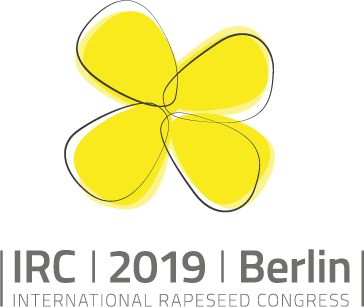Berlin, 25. April 2019 – The 15th International Rapeseed Congress (IRC) is the first rapeseed congress to be held in Germany in 45 years. Over 800 scientists and representatives from the agricultural sector will meet in Berlin from 16th to 19th June. The IRC is the most important international scientific congress on rapeseed. New developments in genetics, breeding, cultivation, plant protection, analysis and utilisation of rapeseed oil and animal feed will be presented and discussed in plenary lectures, thematic lecture sessions and working groups running over four days at the bcc Berlin Congress Center.
In addition to the thematic “Parallel Sessions”, workshops will address particularly relevant individual topics. For example, workshops will look specifically at rapeseed diseases such as clubroot, blackleg and sclerotinia. Further agronomic topics such as heat and drought stress, future-proof pest control and rape as a protein plant will be discussed in-depth in the workshops. “The extensive programme not only presents the latest research results but creates the basis through the workshops for an intensive exchange of ideas and experience, only available to the whole international rapeseed community every four years," explains Professor Wolfgang Friedt, IRC Chairman and GCIRC President.
Trade Exhibition
Alongside the main scientific programme, a trade exhibition offers companies an opportunity to showcase their activities. In cooperation with the German Agricultural Society (DLG), companies, organisations and institutes have a chance to establish direct contacts with the international participants.
The congress will be rounded off with an official congress dinner on 18th June in what used to be the departure hall at Tempelhof Airport. “We are delighted to have an opportunity to offer congress participants, who will be coming to Berlin from all over the world, this special historical venue for the dinner, in a location that is so extremely important for Berlin,” Wolfgang Vogel, Chairman of the Union for the Promotion of Oil and Protein Plants (UFOP), notes.
The field trips organised after the congress give participants a chance to get to know the practical side of German rapeseed breeding too. They provide a glimpse behind the scenes of modern rapeseed cultivation, as well as offering participants an opportunity to build their professional networks. There will be visits to institutes, enterprises and rapeseed cultivation areas in Brandenburg, Saxony-Anhalt, Saxony, Hesse and Mecklenburg-Western Pomerania.
Further details about the programme are also available on the website.




